|
|
|
Sort Order |
|
|
|
Items / Page
|
|
|
|
|
|
|
| Srl | Item |
| 1 |
ID:
097103
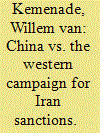

|
|
|
|
|
| Publication |
2010.
|
| Summary/Abstract |
The EU, Israel, and United States have been conducting an intensive campaign of diplomatic skirmishes with Brazil, China, Turkey, and others over imposing sanctions on Iran to stop it from moving from enriching uranium to building nuclear weapons. The sanctions needed to be "crippling" according to U.S. Secretary of State Hillary Rodham Clinton, "massive" according to President Nicolas Sarkozy of France, and "biting" according to Prime Minister Benjamin Netanyahu of Israel.1 Yet, an operational consensus had not been obtained by May 2010. Some in the United States, particularly within Congress, appear willing to be indiscriminate in hitting not only the core of the Iranian regime but also the Iranian people, while Israel is defiantly planning a potentially catastrophic military attack on Iran's nuclear sites even without the consent of the United States.2 On the other hand, Europeans want to be more circumspect and focus on targeting the hard core of Iran's regime rather than its public.
|
|
|
|
|
|
|
|
|
|
|
|
|
|
|
|
| 2 |
ID:
097100
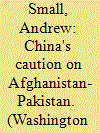

|
|
|
|
|
| Publication |
2010.
|
| Summary/Abstract |
The ongoing crisis in Afghanistan and Pakistan looks like a prime candidate for closer cooperation between the United States and China. There are various broadly shared interests in combating terrorism, containing rising extremism, and supporting the stability of both states. With its extensive influence in Pakistan and substantial economic capacity, Beijing has important assets to bring to the table. In practice, however, efforts to achieve convergence have proved frustrating. Differences run deep over how to address the extremist threat and the broader geopolitics of the region. And as is true of its foreign policy elsewhere, China pursues a relatively narrow conception of its interests in Afghanistan and Pakistan, rather than supporting a more widely shared set of goals.
|
|
|
|
|
|
|
|
|
|
|
|
|
|
|
|
| 3 |
ID:
097096
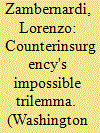

|
|
|
|
|
| Publication |
2010.
|
| Summary/Abstract |
Ever since the conventional wars in Iraq and Afghanistan turned into irregular conflicts, both students of war and practitioners have furiously debated counterinsurgency's logic, goals, and chances of success.1 Counterinsurgency doctrine, however, has experienced no radical change since its original development. It was originally, though not systematically, formulated in the twentieth century by none other than the British officer, T.E. Lawrence, and later extended, on the basis of the writings of Mao, by a variety of counterrevolutionary strategists such as the French theorists of la guerre revolutionnaire. Even the new counterinsurgency doctrine devised by General David Petraeus in Iraq and Afghanistan does not represent a fundamental shift away from its traditional understanding, which sees this type of conflict as a contest for the support and control of population and, in turn, places the security of the populace at the hub of military operations.
|
|
|
|
|
|
|
|
|
|
|
|
|
|
|
|
| 4 |
ID:
097098


|
|
|
|
|
| Publication |
2010.
|
| Summary/Abstract |
The U.S. government has recently begun to emphasize the need for greater engagement with problem states. Proponents of this approach argue that diplomacy is necessary, even with these regimes. Critics, however, maintain that engagement with these regimes is tantamount to appeasement and signals acceptance of behavior that ought to be condemned. In their view, there is little to be gained by talking to these states. Thus, diplomatic sanctions-or sanctions characterized by political disengagement-are seen as a low-cost means of isolating and delegitimizing regimes.
|
|
|
|
|
|
|
|
|
|
|
|
|
|
|
|
| 5 |
ID:
097108


|
|
|
|
|
| Publication |
2010.
|
| Summary/Abstract |
The geopolitical theorist Sir Halford Mackinder once observed that democracies find it difficult to think strategically in peacetime. It should not be surprising then that one of the United States' core peacetime strategic objectives for more than half a century-the development of a robust international system based on free trade, international law, and international institutions-was born in wartime. The 1944 Bretton Woods agreement laid the foundation for this system to reconcile and reconstruct the Axis powers and avoid another world war. This strategy was further developed in 1950 with "NSC 68," which claimed that the development of a healthy international community should be pursued by the United States even without the existence of a Soviet threat.
|
|
|
|
|
|
|
|
|
|
|
|
|
|
|
|
| 6 |
ID:
097105
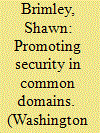

|
|
|
|
|
| Publication |
2010.
|
| Summary/Abstract |
Over the last several years, it has become apparent that the domains facilitating all international interaction-sea, air, space, and cyberspace-are increasingly congested, contested, and complex. These domains constitute the connective tissue of an ever more interconnected international system. It should, therefore, come as no surprise that the level of activity and investment by both state and non-state actors is rapidly increasing. Satellites are being launched, submarines are being built, long-range aircraft procured, and powerful cyberspace capabilities are being maintained by states that only two decades ago were just beginning to employ rudimentary computer systems. Non-state actors, ranging from pirates off Somalia to cyber "hacktivists" to the growing number of commercial players that own and operate satellites, further complicate this landscape.
|
|
|
|
|
|
|
|
|
|
|
|
|
|
|
|
| 7 |
ID:
097106
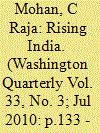

|
|
|
|
|
| Publication |
2010.
|
| Summary/Abstract |
One of the major emerging U.S. security debates is the impact of rising powers on managing global commons such as the sea, air, space, and cyberspace domains. If the U.S. command of the commons was taken for granted a decade ago,1 current concerns include the consequences of relative U.S. decline, the rapid diffusion of technological capabilities, crowding of the global commons, and the challenge of managing the commons in a multipolar world.2 India's significant technological capabilities and operational programs to exploit the commons are not in doubt. What is not clear, however, is whether the U.S. strategic community sees India as a potential partner in managing the global commons.
|
|
|
|
|
|
|
|
|
|
|
|
|
|
|
|
| 8 |
ID:
097095


|
|
|
|
|
| Publication |
2010.
|
| Summary/Abstract |
In his commendably candid interview with Time in January 2010, President Barack Obama noted that managing politics in the Israeli-Palestinian conflict "is just really hard."1 The president, however, might well have been speaking about the Middle East as a whole. It is not just the Israeli-Palestinian track that has been difficult, so too have the Iranian and Syrian tracks, where engagement has not taken traction. Iran, Iraq, Israel, Lebanon, Syria-nothing has been exactly easy for U.S. policymakers this past year. To be fair to the president, he has taken office at a time when the whole region is journeying into a new era. In a sense, the president is facing the consequences of three key events that took place in the region more than 20 years ago.
|
|
|
|
|
|
|
|
|
|
|
|
|
|
|
|
| 9 |
ID:
097097


|
|
|
|
|
| Publication |
2010.
|
| Summary/Abstract |
The word often used to describe President Barack Obama's approach to foreign policy is "engagement." Obama has expressed his instinctive willingness to talk to the enemies of the United States, promised a new era of engagement with the Muslim world, extended an olive branch to Iran, spoken of his desire to engage new partners in global governance, and articulated a vision of international politics premised on the existence of shared interests among nations. Yet, engagement is an amorphous and vague concept. Its purpose, parameters, and promise remain unclear. To some, it is a tactic, not a strategy.
|
|
|
|
|
|
|
|
|
|
|
|
|
|
|
|
| 10 |
ID:
097107
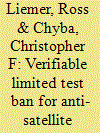

|
|
|
|
|
| Publication |
2010.
|
| Summary/Abstract |
The growing number of actors pursuing sophisticated outer space programs gives rise to one of the more novel challenges of the global commons. Once the privileged domain of the United States and the Soviet Union, space now accommodates a larger set of countries seeking to enhance their defense capabilities. In January 2007, perhaps most notably, China tested an anti-satellite (ASAT) missile, destroying Fengyun-1C, an old Chinese weather satellite. The weapon was a kinetic-energy ASAT, which homed in on its target and shattered it through high-velocity collision at an altitude of 864 km.1 The impact created thousands of debris fragments concentrated in orbits between 800 and 1,000 km,2 approximately doubling the risk of potentially catastrophic collision for satellites in the crowded 800-900 km range.3 Satellites at these altitudes include commercial communications satellites, a U.S. photoreconnaissance satellite, a Chinese earth science satellite, and a Russian electronic intelligence satellite.4 Most of the Fengyun-1C debris will stay in orbit for several decades; some is expected to remain in space for centuries.
|
|
|
|
|
|
|
|
|
|
|
|
|
|
|
|
|
|
|
|
|